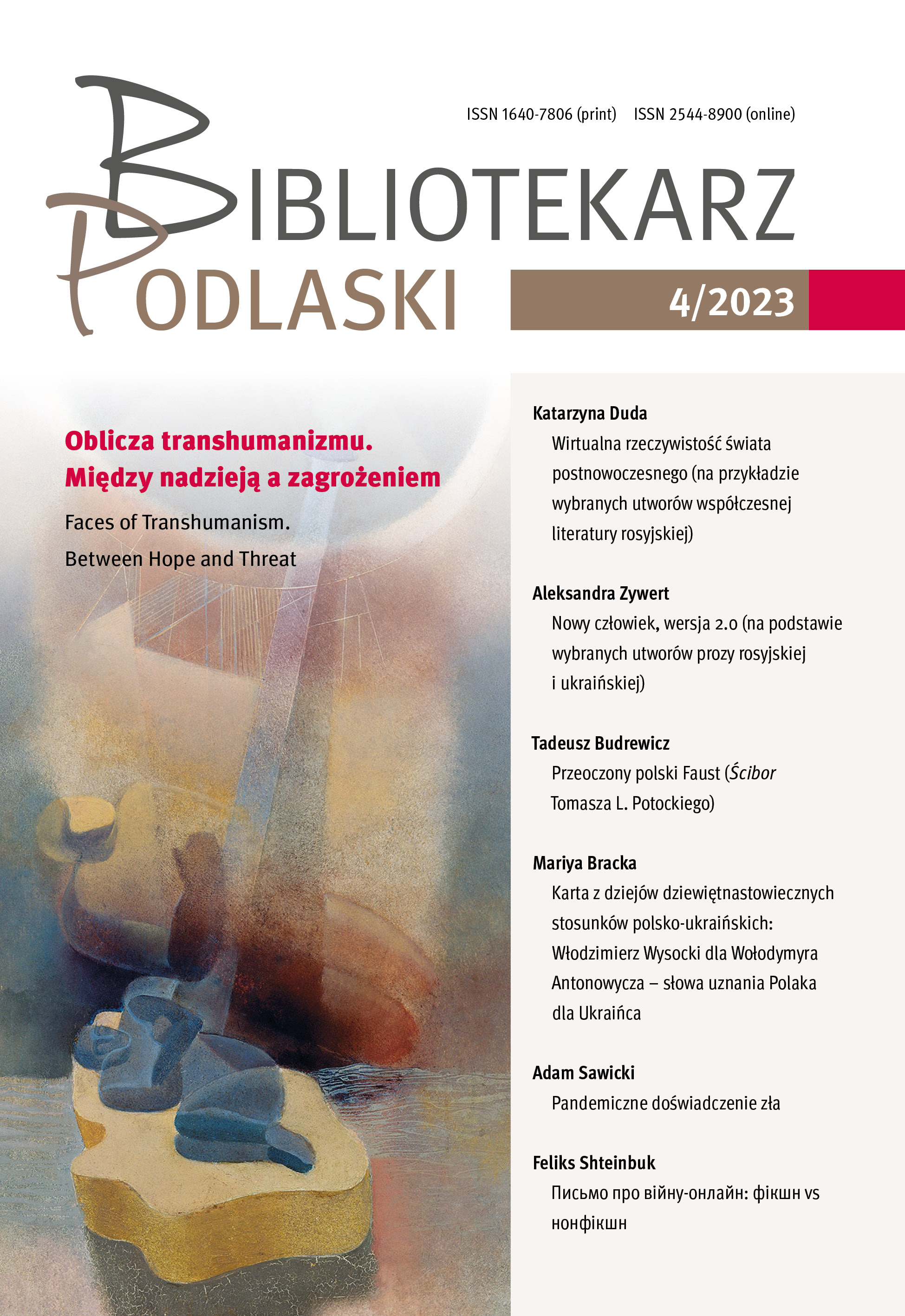Abstract
A strong sense of loneliness and alienation was a common feature among Russian emigrants of the first wave, who were suddenly forced to leave the country due to
the revolutionary events of 1917 and the civil war. They were unexpectedly deprived of contact with their loved ones and familiar places, losing their common denominator: their homeland. Thrown into a foreign world, they desperately missed their relatives and friends, the sounds of their native language, and the familiar materiality of life. The resulting feeling of loneliness led to various types of problems: lack of adaptation to new socio-cultural realities, social isolation, identity crisis, deteriorating mental and (or) physical condition, and creative impotence. Coping strategies for the traumatic experience of emigration included voluntary ghettoization, linguistic purism, and an extremely active exchange of letters with relatives and friends, which somewhat compensated for the lack of physical contact and direct conversation. Through correspondence, some sought information about loved ones left behind, while others sought deeper understanding, sympathy, and the chance to share their problems and fears. The analyzed epistolary material reveals similarities in the fates of the first wave of Russian emigrants, who, regardless of their origin and financial status, experienced similar problems and emotions. This is evident in the correspondence of both well-known emigrants (Mikhail Arcybashev, Ivan Bunin, Vera Muromtseva-Bunina, Aleksandr Kuprin, Nadezhda Teffi, Boris Zaitsev) and less well-known representatives of the post-October diaspora (Klaudia Fłorovskaya, Alexei Gvozdiński).
References
Berdyayev N., Ya i mir ob’’yektov. Opyt filosofii odinochestva i obshcheniya, Parizh 1934.
Bocharova Z.S., Sotsial’naya pomosh’ rossiyskim bezhentsam v 1920–1930-ye gody, „Russkoye zarubezh’ye” 2016, nr 5.
Bocharova Z.S., Uregulirovaniye prav rossiyskikh bezhentsev v Germanii v 1920–1930-ye gg., [w:] Russkiy Berlin 1920–1945. Mezhdunarodnaya nauchnaya konferentsiya 16–18 dekabrya 2002 g., red. L.S. Fleyshman, Moskva 2006.
Bunin I.A., Izbrannyye pis’ma, [w:] tegoż, Pro et contra, Sankt-Peterburg 2001.
Całek A., Nowa teoria listu, Kraków 2019.
Chernova M.B., Fenomen emigratsii i problemy dialoga v sotsiokul’turnom prostranstve, „Sibirskiy Pedagogicheskiy Zhurnal” 2018, nr 3.
Chistyakova O.A., Migratsionnyye protsessy i marginalizatsiya kul’tury, „Vestnik AGU” 2016, nr 4.
Domeracki P., Związki samotności z kontemplacją w perspektywie filozoficznej, „Kultura i Edukacja” 2008, nr 1.
Khrustaleva N.S., Adaptatsiya vykhodtsev iz byvshego SSSR. Vzglyad psikhologa, „Diaspory” 1999, nr 2–3, https://archipelag.ru/ru_mir/volni/4volna/adaptation/ [dostęp: 12.01.2023].
Khrustaleva N.S., Perezhivaniye psikhicheskoy travmy i pechali v usloviyakh emigratsii, „Vestnik Sankt-Peterburgskogo Universiteta” 2010, t. 12, nr 1.
Kiejzik L., Gieorgij Fłorowski o metodzie uprawiania badań naukowych, „Przegląd Filozoficzny – Nowa Seria” 2019, nr 2.
Krupa B., Samotność – znak czasu, [w:] Człowiek na rozdrożu: zrozumieć, aby pomóc, red. Z.B. Gaś, Lublin 2013.
Mne nado, chtoby moya zhizn’ imela kakuyu-nibud’ tsel’ i smysl. Klavdiya Florovskaya: pis’ma k brat’yam Georgiyu i Antoniyu Florovskim, red. L. Kiyeyzik, N. Orlova, Zelena Góra 2019.
Ndiaye I.A., Misja literatury emigracyjnej („pierwsza fala” emigracji rosyjskiej), „Acta Polono-Ruthenica” 2007, nr 12.
Ostafińska-Konik A., Tożsamość narodowa ery globalizacji, „Państwo i Społeczeństwo VII” 2007, nr 2.
Pawlak A., Psychospołeczne uwarunkowania zdrowia emigrantów i ich rodzin w świetle własnych badań jakościowych, „Przegląd Socjologiczny” 2012, t. 61, nr 2.
Pawlak-Kałuzińska A., Zdrowie a samotność i osamotnienie migrantów zarobkowych, „Przegląd Socjologiczny” 2022, t. 71, nr 2.
Perepiska Teffi s I.A. i V.N. Buninymi. 1920–1939, oprac. R. Davies i E. Haber, „Diaspora: Novyye Materialy” 2001, nr 1.
Pis’ma A.A. Gvozdinskogo Ye.L. Miller, oprac. O.R. Demidova, „Minuvsheye. Istoricheskiy Al’manakh” 1995, nr 18.
Pis’ma Kuprina, http://kuprin-lit.ru/kuprin/pisma/letter-48.htm [dostęp: 14.01.2023].
Russkaya Praga, Russkaya Nitstsa, Russkiy Parizh. Iz dnevnika Borisa Lazarevskogo (tridtsat’ tri Pis’ma Mikhaila Artsybasheva, Ivana Bunina, Aleksandra Kuprina, Il’i Surgucheva i dr.), oprac. S. Shumikhin, „Diaspora: Novyye Materialy” 2001, nr 1.
Rybicka E., Antropologiczne i komunikacyjne aspekty dyskursu antropologicznego, „Teksty Drugie” 2004, nr 4.
Sałajczykowa J., Prozaicy pierwszej fali emigracji rosyjskiej 1920–1940, Gdańsk 2003.
Sandomirskaja I., Duch litery „ъ”, tłum. D. Ulicka, „Teksty Drugie” 1993, nr 4–6.
Sendyk M., Osamotnienie jako konsekwencja zaburzeń więzi emocjonalnych w rodzinie, „Wychowanie w Rodzinie” 2011, nr 4.
Szczepański J., Sprawy ludzkie, Warszawa 1984.
Tillich P., Osamotnienie i odosobnienie, tłum. K. Mech, „Znak” 1991, nr 431 (4).
Zaytsev B., Pis’ma 1923–1971 gg., [w:] tegoż, Sobraniye sochineniy, T. 11, Pis’ma. Stat’i. Vospominaniya sovremennikov, Moskva 2001.

This work is licensed under a Creative Commons Attribution-ShareAlike 4.0 International License.
Copyright (c) 2024 Nel Bielniak


